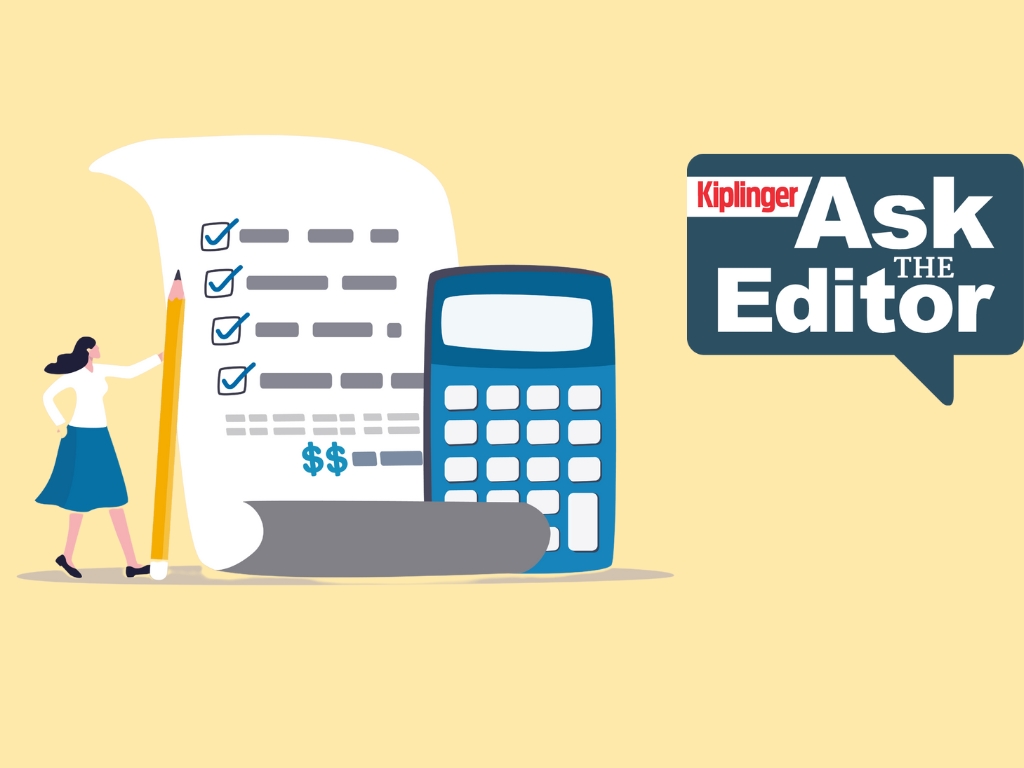Ask the Editor: Reader Questions, April 11 — IRAs, RMDs and PTPs.
In our Ask the Editor series, Joy Taylor, The Kiplinger Tax Letter Editor, answers questions related to IRAs and other retirement accounts.

Profit and prosper with the best of Kiplinger's advice on investing, taxes, retirement, personal finance and much more. Delivered daily. Enter your email in the box and click Sign Me Up.
You are now subscribed
Your newsletter sign-up was successful
Want to add more newsletters?

Delivered daily
Kiplinger Today
Profit and prosper with the best of Kiplinger's advice on investing, taxes, retirement, personal finance and much more delivered daily. Smart money moves start here.

Sent five days a week
Kiplinger A Step Ahead
Get practical help to make better financial decisions in your everyday life, from spending to savings on top deals.

Delivered daily
Kiplinger Closing Bell
Get today's biggest financial and investing headlines delivered to your inbox every day the U.S. stock market is open.

Sent twice a week
Kiplinger Adviser Intel
Financial pros across the country share best practices and fresh tactics to preserve and grow your wealth.

Delivered weekly
Kiplinger Tax Tips
Trim your federal and state tax bills with practical tax-planning and tax-cutting strategies.

Sent twice a week
Kiplinger Retirement Tips
Your twice-a-week guide to planning and enjoying a financially secure and richly rewarding retirement

Sent bimonthly.
Kiplinger Adviser Angle
Insights for advisers, wealth managers and other financial professionals.

Sent twice a week
Kiplinger Investing Weekly
Your twice-a-week roundup of promising stocks, funds, companies and industries you should consider, ones you should avoid, and why.

Sent weekly for six weeks
Kiplinger Invest for Retirement
Your step-by-step six-part series on how to invest for retirement, from devising a successful strategy to exactly which investments to choose.
Each week, in our new Ask the Editor series, Joy Taylor, The Kiplinger Tax Letter Editor, answers questions on topics submitted by readers. This week, she’s looking at questions related to IRAs and other retirement accounts. (Get a free issue of The Kiplinger Tax Letter or subscribe.)
Q1: RMDs for 2025
Due to the recent volatility in stock prices in almost everyone’s IRA portfolio, which might get worse as time goes by, do you think that the IRS may eliminate required minimum distributions for 2025, as it did during the COVID-19 pandemic?
I don’t see that happening. First, it is Congress, not the IRS, that must act to waive the RMD for 2025. For example, Congress waived RMDs for 2020 in the CARES Act soon after the pandemic started. I can’t say for sure, but I do not think that Republicans in Congress will provide an RMD waiver for 2025, given that the stock market volatility is apparently because of the tariff actions taken by President Trump. I guess if the stock market falls precipitously and remains low for a while, then maybe we will see the RMD relief, but it’s way too soon to tell.
— Joy Taylor, Editor The Kiplinger Tax Letter
Q2: IRA Contributions and RMDs
I am 75 and working, and I am contributing to my traditional IRA for 2025. Can I offset my 2025 IRA required minimum distribution by the contribution?
No. According to the IRS, an individual cannot offset his or her RMD for a taxable year by the amount of any retirement contributions for that same taxable year. Contributions and distributions are separate transactions and are reported as such each year to the IRS by the financial institution or other IRA custodian.
— Joy Taylor, Editor The Kiplinger Tax Letter
From just $107.88 $24.99 for Kiplinger Personal Finance
Become a smarter, better informed investor. Subscribe from just $107.88 $24.99, plus get up to 4 Special Issues

Sign up for Kiplinger’s Free Newsletters
Profit and prosper with the best of expert advice on investing, taxes, retirement, personal finance and more - straight to your e-mail.
Profit and prosper with the best of expert advice - straight to your e-mail.
Q3: Roth IRAs and the Five-Year Rules
I understand that to withdraw money from a Roth IRA without paying tax or a penalty on the earnings, the account owner must have had the money in the Roth IRA for at least five years and be age 59½ or older. My question relates to when the five-year clock starts if contributions are made over several years. Also, do the rules differ for Roth IRA conversions?
There are actually two five-year rules that apply to Roth IRAs. The first applies to Roth IRA contributions, including rollovers and conversions, and whether distributed earnings are tax-free to you. Under this rule, distributions of earnings after age 59½ aren’t taxed if at least five tax years have passed since the owner first contributed to a Roth IRA. For this first five-year rule, the five-year clock starts the first time that money is deposited into any Roth IRA that you own, through either a contribution or a conversion from a traditional IRA. The clock doesn’t start for later Roth contributions, conversions or for newly opened Roth IRA accounts.
The second five-year rule applies specifically to Roth IRA conversions, and whether the 10% early distribution penalty hits pre-age-59½ payouts. This rule is an anti-abuse rule to prevent people who are younger than 59½ from circumventing the early IRA withdrawal penalty by first doing a Roth conversion and soon thereafter taking the money out of the Roth IRA. That’s because the 10% early withdrawal penalty doesn’t hit Roth IRA conversions. This second five-year rule doesn’t apply to new contributions to Roth IRAs, but to conversions of pre-tax income from traditional IRAs to Roths. Under this rule, if someone who is younger than 59½ does a Roth conversion, and later takes a distribution within five years of the conversion and before turning 59½, then the amount of conversion principal that is withdrawn is hit with the 10% penalty. Once you turn 59½, you needn’t worry, even if you take a payout before your conversion meets the five-year period. Under this second five-year rule, each conversion has its own separate five-year period, which differs from the first five-year rule discussed above. For instance, if you do multiple Roth IRA conversions, there will be multiple five-year time periods, even if each conversion is done into the same Roth IRA account that you have owned for years.
You can read more about this in an article I've written about these two Roth IRA five-year rules, which includes examples and a set of FAQs.
— Joy Taylor, Editor The Kiplinger Tax Letter
Q4: Publicly Traded Partnerships
I am thinking of investing in a publicly traded pipeline partnership. I understand that if I invest through my taxable account, I would get a K-1 form, which can be a headache. What about if I have my IRA buy the units? Any tax traps?
IRAs may invest in a publicly traded partnership (sometimes called a master limited partnership). PTP units are traded on an established securities exchange, similar to publicly traded corporations, and PTPs can make big distributions. As a result, IRA owners might look at them as good investments for their IRAs. But there is a catch. The IRA can owe tax. PTPs issue Schedule K-1s to their owners (including IRAs), reporting the owner’s share of ordinary business income or loss. For IRAs, this income is generally considered unrelated business taxable income (UBTI), and the IRA may owe tax. If UBTI from all of an IRA’s investments exceeds $1,000, then the excess is taxed at a rate of up to 37% (the more condensed income tax brackets for trusts, not individuals, are used for this purpose). The IRA, not the individual owner, uses IRS Form 990-T to report and compute the tax.
It is our understanding that most big IRA custodians will handle the preparation and filing of the 990-T, unless the IRA trust agreement between the IRA owner and the custodian provides otherwise. For self-directed IRAs, the burden of filing the 990-T would fall on the IRA owner. Any taxes owed on an IRA's excess unrelated business taxable income are paid from available assets within that IRA.
— Joy Taylor, Editor The Kiplinger Tax Letter
We have already received many questions from readers on topics such as qualified charitable distributions from traditional IRAs, the 10-year cleanout rule on inherited IRAs, and much more. We’ll answer some of these in a future Ask the Editor round-up. So keep those questions coming!
Subscribers of The Kiplinger Tax Letter can ask Joy questions about a tax topic. You'll find full details of how to submit questions in The Kiplinger Tax Letter. (Get a free issue of The Kiplinger Tax Letter or subscribe.)
Not all questions submitted will be published, and some may be condensed and/or combined with other similar questions and answers, as required editorially. The answers provided by our editors and experts, in this Q&A series, are for general informational purposes only. While we take reasonable precautions to ensure we provide accurate answers to your questions, this information does not and is not intended to, constitute independent financial, legal, or tax advice. You should not act, or refrain from acting, based on any information provided in this feature. You should consult with a financial or tax advisor regarding any questions you may have in relation to the matters discussed in this article.
Read more
- Ask the Editor, April 4, 2025: Questions about the new tax bill
- Ask the Editor, March 28, 2025: Questions about filing tax returns
- Ask the Editor, March 21, 2025: Questions on reporting income and deductions.
Profit and prosper with the best of Kiplinger's advice on investing, taxes, retirement, personal finance and much more. Delivered daily. Enter your email in the box and click Sign Me Up.

Joy is an experienced CPA and tax attorney with an L.L.M. in Taxation from New York University School of Law. After many years working for big law and accounting firms, Joy saw the light and now puts her education, legal experience and in-depth knowledge of federal tax law to use writing for Kiplinger. She writes and edits The Kiplinger Tax Letter and contributes federal tax and retirement stories to kiplinger.com and Kiplinger’s Retirement Report. Her articles have been picked up by the Washington Post and other media outlets. Joy has also appeared as a tax expert in newspapers, on television and on radio discussing federal tax developments.
-
 Dow Adds 1,206 Points to Top 50,000: Stock Market Today
Dow Adds 1,206 Points to Top 50,000: Stock Market TodayThe S&P 500 and Nasdaq also had strong finishes to a volatile week, with beaten-down tech stocks outperforming.
-
 Ask the Tax Editor: Federal Income Tax Deductions
Ask the Tax Editor: Federal Income Tax DeductionsAsk the Editor In this week's Ask the Editor Q&A, Joy Taylor answers questions on federal income tax deductions
-
 States With No-Fault Car Insurance Laws (and How No-Fault Car Insurance Works)
States With No-Fault Car Insurance Laws (and How No-Fault Car Insurance Works)A breakdown of the confusing rules around no-fault car insurance in every state where it exists.
-
 Ask the Editor, February 6: Questions on Federal Income Tax Deductions
Ask the Editor, February 6: Questions on Federal Income Tax DeductionsAsk the Editor In this week's Ask the Editor Q&A, Joy Taylor answers questions on federal income tax deductions
-
 Should You Do Your Own Taxes This Year or Hire a Pro?
Should You Do Your Own Taxes This Year or Hire a Pro?Taxes Doing your own taxes isn’t easy, and hiring a tax pro isn’t cheap. Here’s a guide to help you figure out whether to tackle the job on your own or hire a professional.
-
 Ask the Editor, January 30: Questions on Social Security Benefits Taxation
Ask the Editor, January 30: Questions on Social Security Benefits TaxationAsk the Editor In this week's Ask the Editor Q&A, Joy Taylor answers questions on the taxation of Social Security benefits
-
 Don't Overpay the IRS: 6 Tax Mistakes That Could Be Raising Your Bill
Don't Overpay the IRS: 6 Tax Mistakes That Could Be Raising Your BillTax Tips Is your income tax bill bigger than expected? Here's how you should prepare for next year.
-
 Will IRS Budget Cuts Disrupt Tax Season? What You Need to Know
Will IRS Budget Cuts Disrupt Tax Season? What You Need to KnowTaxes The 2026 tax season could be an unprecedented one for the IRS. Here’s how you can be proactive to keep up with the status of your return.
-
 3 Retirement Changes to Watch in 2026: Tax Edition
3 Retirement Changes to Watch in 2026: Tax EditionRetirement Taxes Between the Social Security "senior bonus" phaseout and changes to Roth tax rules, your 2026 retirement plan may need an update. Here's what to know.
-
 Ask the Tax Editor, January 23: Questions on Residential Rental Property
Ask the Tax Editor, January 23: Questions on Residential Rental PropertyAsk the Editor In this week's Ask the Editor Q&A, Joy Taylor answers questions on reporting income and loss from residential rental property.
-
 Ask the Editor, January 16: Tips for Filing Your Form 1040
Ask the Editor, January 16: Tips for Filing Your Form 1040Ask the Editor In this week's Ask the Editor Q&A, Joy Taylor answers questions on preparing and filing your 2025 Form 1040.